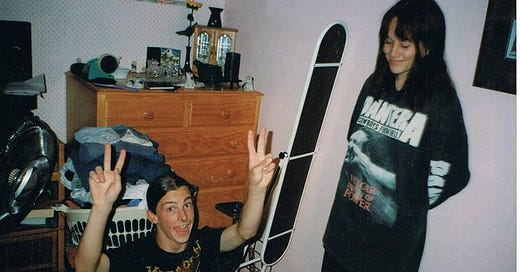Forget weight loss, I’ll take brain health instead
Exercise was something I did to change the appearance of my body, to hit that magic number on the scales. It was certainly never about my brain.
It was the nineties, and as far as I could tell, the world saw the curves of a woman’s body as disgusting. I’d absorbed this information by osmosis: fat women in movies were always the baddies; only skinny women featured in music videos and magazines; and my father offered regular commentary on the bodies of female neighbours and celebrities (“I don’t know why she thinks she can get away with wearing that!”).
Throughout my teens, twenties and thirties, my life revolved around diet and exercise as though it were a religion. I went from calorie counting, to low fat, to low carb, to paleo, to a 2-meal intermittent fasting regime which left me with heart palpitations. I had a morning and evening routine of squatting, lunging, and jumping rope to keep myself within my preferred weight range.
But under-eating and over-exercising often led to binge eating, which led to spirals of self-loathing and more binge eating. After decades of trying to fix myself, seeking self-proclaimed gurus and eating coaches, eventually I gave up. Who cares if I’m chubby, I thought. The world will just have to get over it. And the world absolutely did get over it, since they have always been focused on their own lives, not mine.
But the sad thing is that my exercise went away, too.
For me, exercise was lumped into the same category as dieting. It was something I did to change the appearance of my body, to hit that magic number on the scales. It was never about physical health, even though I occasionally pretended it was. It was certainly never about brain health — I had no knowledge of the connection.
Nowadays, the conversation around what we eat is still fairly messed up (for example, I recently saw an influencer have a conniption over a ripe banana), but I do see improvements in our conversations about exercise. Perhaps it’s because of the increasing amount of research.
Recent studies have shown that relative to adults not exercising, those getting the recommended amount of physical activity (equivalent to 2.5 hours of brisk walking per week) have a 25% lower risk of depression. Other studies show that exercise can reduce the risk of Alzheimer’s disease by up to 45%, with dementia now the leading cause of death for women in Australia.
I just wish I knew twenty years ago that exercise was less about aesthetics and more about brain health. I still would have dropped my overzealous fat-burning routine (no regrets there). But with a genetic lottery that includes diabetes, depression and Alzheimer’s, I would not have stopped all physical activity completely.
These days, the diets are long gone, but I can usually fit in a thirty-minute walk after dinner for the ol’ grey matter. After about six months of walking, I’ve set my sights set on an unassisted pull-up. It feels less like exercise and more like a personal challenge.
Wearing my most unflattering PJs, a cowboy hat for sun protection, and lugging a step ladder behind me (I’m short, and need to actually reach the pull-up bar), sometimes the neighbours see me. But just like the rest of the world, I’m fairly certain they’re focusing on their own lives and don’t care how I look. And if they do, I’m sure they’ll get over it.






Oh how I can relate to this Denise. I think I did every one of these diets and held the same obsession (boyfriend pleasing?) with body image ... Interestingly, my daughter is so confident in her skin. I hope it stays like that. 15-20 minutes of gentle yoga 5 days a week in the morning and living in Paris with no car is my exercise. I'd love to walk in nature though...
Attempting pull-ups in a cowboy hat? Incredible. I still spend a terrifying amount of time thinking about my body, but thankfully, my relationship with exercise has changed over the years. Exercise does so much for my mental health and creativity. Nothing helps my writer's block more than a walk outside!